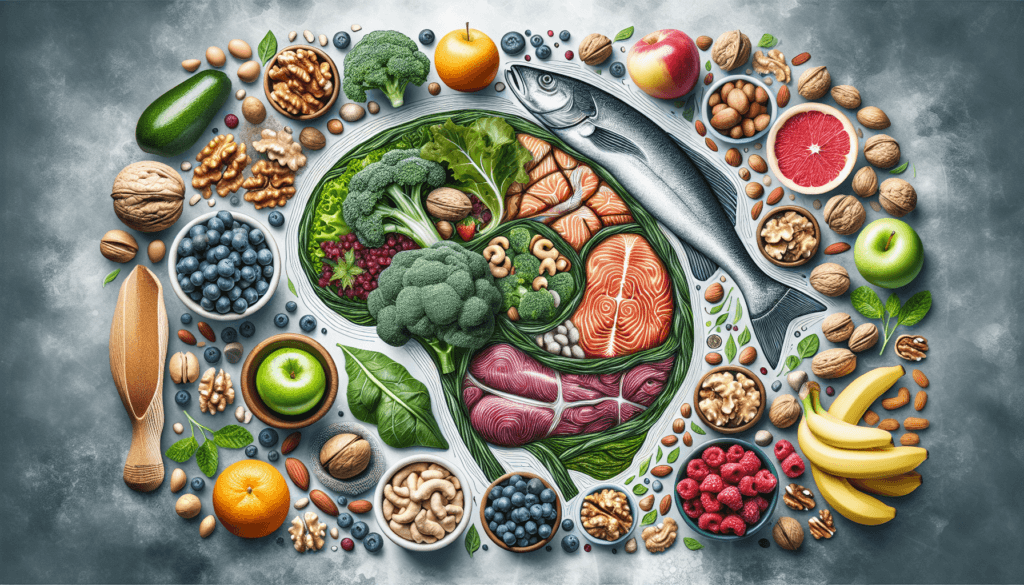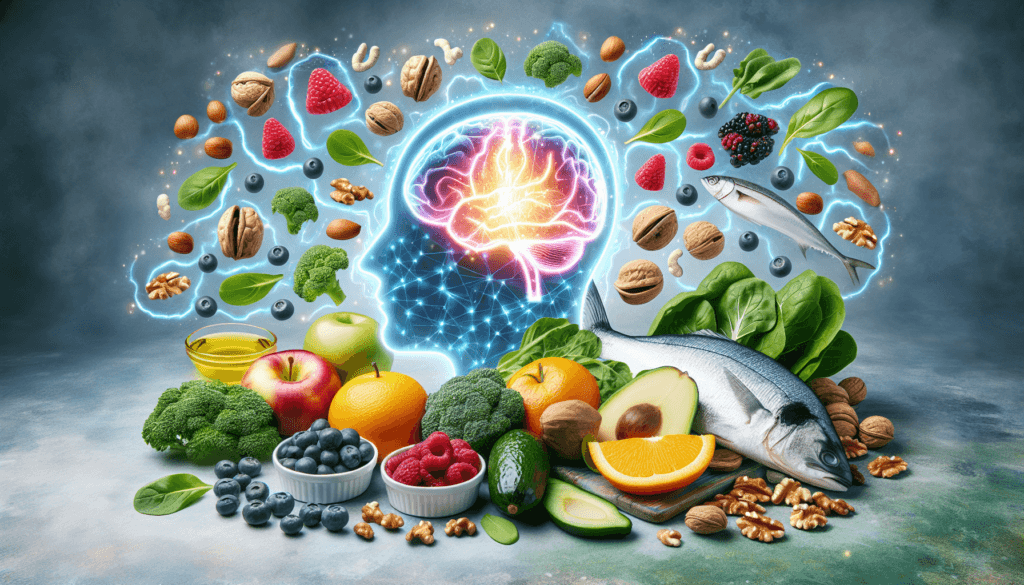If you’re looking to boost your brain health and nourish your body in your golden years, it’s important to prioritize the right foods in your diet. The choices you make in your nutrition can have a significant impact on your cognitive function and overall wellbeing. In this article, we will explore the best foods for brain health in boomer nutrition, providing you with valuable insights and practical tips to enhance your cognitive abilities and support your overall health. So, let’s dive into the world of nutrition and discover the key ingredients for a healthy brain!

The Importance of Brain Health in Boomer Nutrition
As you age, taking care of your brain health becomes increasingly important. The brain is a vital organ that controls numerous functions within your body, including memory, cognition, and overall well-being. But did you know that what you eat can have a significant impact on the health of your brain? This is where boomer nutrition comes into play.
Understanding the Impact of Aging on Brain Health
As we age, our brains undergo various changes that can affect its function and overall health. It is common for cognitive decline to occur, leading to issues with memory, focus, and mental clarity. Age-related diseases such as dementia and Alzheimer’s are also prevalent among older adults. However, it is essential to understand that the aging process does not guarantee these conditions. By taking proactive steps in boomer nutrition, you can significantly reduce the risk and support your brain health.
Why Boomer Nutrition Is Critical for Brain Health
Boomer nutrition plays a significant role in supporting brain health and cognitive function. By providing essential nutrients and antioxidants, a well-balanced diet can nourish your brain and help maintain its optimal functioning. Additionally, certain foods have been shown to enhance memory, concentration, and overall brain health, making them particularly important for boomers. Let’s explore the essential nutrients and foods that should be included in a boomer’s diet for optimal brain health.
Essential Nutrients for Brain Health
Omega-3 Fatty Acids
Omega-3 fatty acids are a type of polyunsaturated fat that has been found to have numerous benefits for brain health. These fats are known to promote healthy brain cell structure, reduce inflammation, and improve overall cognitive function. Fish, particularly fatty fish like salmon, mackerel, and sardines, are excellent sources of omega-3 fatty acids. Including these fish in your diet at least twice a week can provide you with the necessary omega-3s for optimal brain health.
Antioxidants
Antioxidants play a crucial role in protecting the brain from oxidative stress and inflammation, both of which can contribute to age-related cognitive decline. Foods rich in antioxidants include berries, such as blueberries, strawberries, and blackberries, as well as colorful fruits and vegetables like spinach, kale, and carrots. Including a variety of these antioxidant-rich foods in your daily diet can help protect your brain and support its health.
Vitamin B12
Vitamin B12 is essential for brain health as it helps maintain the integrity of the brain’s nerve cells and supports the production of red blood cells. As you age, your body’s ability to absorb vitamin B12 decreases, making supplementation or dietary intake crucial. Animal-based foods like meat, fish, eggs, and dairy products are excellent sources of vitamin B12. If you follow a plant-based diet, consider incorporating fortified foods, such as plant-based milks or cereals, or speak to your doctor about B12 supplements.
Vitamin D
Vitamin D is not only important for bone health but also plays a role in brain health. Research has shown that a deficiency in vitamin D may be associated with cognitive decline and an increased risk of age-related brain conditions. The primary source of vitamin D is sunlight, but it can also be obtained through foods such as fatty fish, fortified dairy products, and egg yolks. If you have limited sun exposure or are unable to obtain sufficient amounts of vitamin D through diet, speak to your healthcare provider about supplementation.
Magnesium
Magnesium is a crucial mineral for brain health as it supports various brain functions, including memory and learning. It also helps regulate neurotransmitter activity and protects against age-related cognitive decline. Foods rich in magnesium include leafy green vegetables, nuts and seeds, whole grains, and legumes. By including these magnesium-rich foods in your daily diet, you can provide your brain with the essential nutrient it needs to function optimally.
Foods that Boost Brain Health
Fatty Fish
Fatty fish, such as salmon, mackerel, and sardines, are not only excellent sources of omega-3 fatty acids but also contain other essential nutrients that support brain health, including protein, vitamin D, and B vitamins. Including fatty fish in your diet at least twice a week can provide your brain with the necessary nutrients to thrive.
Blueberries
Blueberries are often referred to as a “superfood” for their numerous health benefits, including their positive impact on brain health. These tiny berries are rich in antioxidants and flavonoids that have been shown to improve memory, cognition, and overall brain function. Consider incorporating blueberries into your diet as a snack, in smoothies, or as a topping for oatmeal or yogurt.
Turmeric
Turmeric is a vibrant yellow spice commonly used in Asian cuisine and is known for its anti-inflammatory properties. Curcumin, the active compound in turmeric, has been shown to cross the blood-brain barrier and has potent antioxidant and anti-inflammatory effects. Adding turmeric to your dishes or enjoying a warm cup of turmeric tea can be a delicious way to support your brain health.
Broccoli
Broccoli is a nutrient-packed vegetable that is rich in antioxidants, vitamins, and minerals. It contains compounds known as glucosinolates that have been shown to have neuroprotective properties and may help reduce the risk of cognitive decline. Including broccoli in your diet, whether steamed, roasted, or in salads, can provide your brain with essential nutrients and support its health.
Pumpkin Seeds
Pumpkin seeds are a rich source of magnesium, iron, zinc, and antioxidants – all of which are essential for brain health. These small seeds have been found to improve memory, focus, and overall cognitive function. Enjoy pumpkin seeds as a snack on their own or add them to salads, yogurt, or baked goods for an extra brain-boosting boost.
The Role of Water for Brain Health
Hydration and Cognitive Function
Proper hydration is essential for overall health, and it also plays a role in maintaining optimal brain function. Dehydration can lead to headaches, fatigue, and difficulty concentrating, all of which can impair cognitive function. Staying adequately hydrated throughout the day can help ensure that your brain is functioning at its best.
How Much Water Should Boomers Consume?
The amount of water you need depends on various factors, including your age, sex, activity level, and overall health. As a general guideline, it is recommended that men aim for about 3.7 liters (15 cups) of fluids per day, while women should aim for approximately 2.7 liters (11 cups) of fluids per day. This includes fluids from all sources, including water, other beverages, and foods with high water content.

The Impact of Sugar and Processed Foods on Brain Health
Negative Effects of Sugar on Cognitive Function
A diet high in added sugars has been linked to various adverse health effects, including impaired cognitive function. Consuming excessive amounts of sugar can lead to inflammation, insulin resistance, and oxidative stress, all of which can negatively impact brain health. It is important to limit your intake of sugary foods and beverages to support optimal brain function.
How Processed Foods Affect Brain Health
Processed foods, which often contain high levels of sugar, unhealthy fats, and artificial additives, have been shown to have negative effects on brain health. These foods provide little to no nutritional value and can contribute to inflammation, oxidative stress, and impaired brain function. Opting for whole, unprocessed foods instead can provide your brain with the nutrients it needs to thrive.
The Benefits of Nuts for Brain Health
Walnuts
Walnuts are often referred to as the “brain nut” due to their unique shape resembling the human brain and their numerous benefits for cognitive function. These nuts are rich in omega-3 fatty acids, antioxidants, and polyphenols, which have been shown to improve memory, concentration, and overall brain health. Include a handful of walnuts in your diet as a snack or add them to salads, oatmeal, or baked goods for a brain-boosting treat.
Almonds
Almonds are packed with nutrients that support brain health, including vitamin E, magnesium, and antioxidants. Vitamin E, in particular, has been associated with a reduced risk of cognitive decline. Enjoy almonds as a snack, use almond butter as a spread, or incorporate them into your favorite recipes for a nutritious and brain-boosting addition.
Cashews
Cashews are not only delicious but also provide numerous benefits for brain health. They are a great source of magnesium, which is essential for cognitive function, as well as zinc and antioxidants that support overall brain health. Snack on cashews on their own or use them in stir-fries, salads, or homemade trail mixes for a brain-healthy boost.

Herbs and Spices for Brain Health
Rosemary
Rosemary is an aromatic herb that is not only flavorful but also beneficial for brain health. It contains compounds that have been shown to improve memory and concentration and can help protect against age-related cognitive decline. Sprinkle rosemary on roasted vegetables, add it to marinades, or incorporate it into your favorite dishes to enjoy its brain-boosting benefits.
Sage
Sage is another herb that has been used for centuries for its medicinal properties, including its positive impact on memory and cognitive function. Research suggests that sage may improve memory retention and retrieval, making it a valuable herb for brain health. Add sage to your recipes, brew it into teas, or use it as a seasoning to reap its brain-boosting benefits.
Cinnamon
Cinnamon is a delicious spice that not only adds a warm and comforting flavor to dishes but also provides numerous benefits for brain health. It has been shown to enhance cognitive function, improve memory, and help regulate blood sugar levels, which can positively impact brain health. Sprinkle cinnamon on oatmeal, add it to baked goods, or use it to spice up your morning coffee for a brain-healthy dose.
The Role of Dark Chocolate in Brain Health
The Power of Flavonoids
Dark chocolate, particularly those with a high percentage of cocoa, is rich in flavonoids – powerful antioxidants that have been linked to numerous health benefits. Flavonoids have been shown to improve blood flow to the brain, enhance cognitive function, and protect against age-related cognitive decline. Indulging in a small amount of dark chocolate can be a delicious way to support your brain health.
The Recommended Portion Size
When it comes to dark chocolate, moderation is key. While it has many health benefits, dark chocolate is still high in calories and should be enjoyed in moderation. Aim for a portion size of about 1 ounce (28 grams) per day, and choose dark chocolate with at least 70% cocoa content to reap its brain-boosting benefits.
The Importance of a Balanced Diet for Brain Health
Eating a Variety of Nutrient-Dense Foods
While individual nutrients and foods have shown various benefits for brain health, it is essential to remember that no single food can provide all the necessary nutrients your brain needs. A balanced diet that includes a variety of nutrient-dense foods is key to supporting overall brain health. Incorporate a wide range of fruits, vegetables, whole grains, lean proteins, and healthy fats into your meals to ensure that your brain is getting the necessary nutrients it needs to function optimally.
The Mediterranean Diet Approach
The Mediterranean diet has consistently been associated with numerous health benefits, including improved brain health. This eating pattern focuses on whole foods, such as fruits, vegetables, legumes, whole grains, fish, and olive oil, while limiting processed foods, sugar, and unhealthy fats. Incorporating the Mediterranean diet principles into your lifestyle can provide your brain with the necessary nutrients it needs and support overall brain health.
Lifestyle Factors that Support Brain Health in Boomers
Regular Physical Exercise
Physical exercise is not only beneficial for cardiovascular health and weight management but also plays a significant role in brain health. Regular exercise has been shown to improve memory, enhance cognitive function, and reduce the risk of age-related cognitive decline. Aim for at least 150 minutes of moderate-intensity aerobic activity, such as brisk walking or cycling, per week to support your brain health.
Adequate Sleep
Getting enough sleep is essential for overall health, and it also plays a critical role in supporting brain function. During sleep, your brain consolidates memories, clears toxins, and restores vital functions. Aim for 7-9 hours of quality sleep per night to ensure that your brain has adequate time to rejuvenate and function optimally.
Stress Reduction Techniques
Chronic stress can have detrimental effects on brain health and contribute to cognitive decline. Engaging in stress reduction techniques, such as meditation, deep breathing exercises, yoga, or spending time in nature, can help reduce stress levels and support overall brain health. Find what techniques work best for you and make them a regular part of your routine.
In conclusion, boomer nutrition plays a crucial role in supporting brain health as you age. By incorporating essential nutrients, such as omega-3 fatty acids, antioxidants, and vitamins, into your diet, you can nourish your brain and support its optimal function. Foods like fatty fish, blueberries, turmeric, broccoli, and pumpkin seeds are particularly beneficial for brain health. Additionally, staying hydrated, limiting sugar and processed foods, and incorporating nuts, herbs, and spices into your diet can further enhance brain health. Alongside a balanced diet, adopting a healthy lifestyle that includes regular physical exercise, adequate sleep, and stress reduction techniques can significantly contribute to your brain’s overall well-being. Remember, taking care of your brain health is a lifelong journey, and the choices you make today can have a profound impact on your cognitive function in the future.


